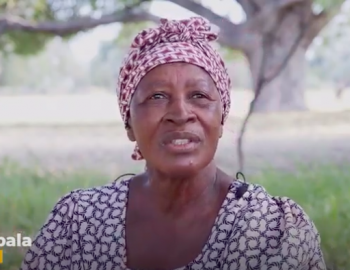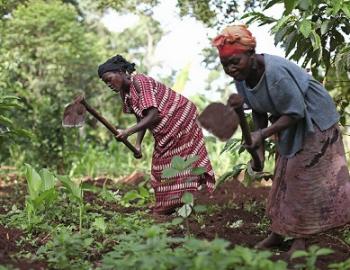From Lessons to Practice and Impact: Scaling up pathways in peoples’ biodiversity management
From Lessons to Practice and Impact: Scaling up pathways in peoples’ biodiversity management
'Putting lessons into practice: Scaling up People/s Biodiversity Management for Food Security' is the title of a three year programme conducted by Oxfam Novib and the International Fund for Agricultural Development. The programme was implemented in three countries, aided by local partners: ANDES in Peru, SEARICE in Vietnam, and CTDT in Zimbabwe. The programme's aim was to uphold, strengthen, and mainstream the rights and technical capabilities of indigenous peoples and smallholder farmers, so that they may influence local to global policies and institutions on the sustainable use of plant genetic resources for food security. This briefing note summarises the findings of the programme, and consolidates them into an overarching framework consisting of six interconnected pathways that each contribute to key areas of achievement. All of the pathways involve exchange, linking and learning, the refinement of concepts and tools, and the connection of local to global scales: * Plant Genetic Resources for Food and Agriculture (PGRFA) Participatory Toolkit: the development of an elaborate participatory toolkit is essential in order to measure progress or attribute change to programme interventions. * Farmer Field School (FFS): this pathway focuses on the development of a FFS curriculum that is simple to use and adaptable. * PGRFA Access: facilitated access to plant genetic resources is a vital right for farmers. Lack of access to a portfolio of diverse crops and varieties is often a significant barrier to well-functioning farmer-managed seed systems. * Policy Influencing: collective policy analysis and advocacy are necessary to strengthen farmer-managed seed systems, and mainstream their local and global importance. * Climate Change Response: this cross-cutting issue influences all of the previous pathways, and must inform the responses of indigenous peoples and smallholder farmers. * Gender Inclusion: effectively improving food security requires recognition of the different roles men and women play in food production, and discussion about what constitutes optimal, fair, and equitable division of labour, decision-making, and access to PGRFA. The purpose behind the six pathways is to encourage innovation which can then be scaled up and mainstreamed at vertical, horizontal, and temporal scales, as well as scaled down to the local context. Ultimately, these pathways will contribute to and scale up people's capacity to organise, learn, and act to continuously innovate and engage in policy changes. Case studies are presented throughout the brief note from each of the three countries involved. One such case study describes the holding of a multi-stakeholder workshop in Zimbabwe which resulted in the formation of a Seed Security Network Dialogue Initiative. This network will review the current seed laws and the establishment of a national seed policy, with an integrated seed system approach The briefing note concludes with eleven policy recommendations, including: enhancing the rights, and technical and decision-making capacity of indigenous peoples and smallholder farmers; the sharing of best practices; increased facilitation of dialogue between national and international public sector breeding institutions and smallholder producers; the establishment of community-to-community exchanges to increase biodiversity; and the need for Intellectual Property Rights holders of short-duration crop strains to make such varieties available to smallholder producers, at no cost, for breeding purposes.



